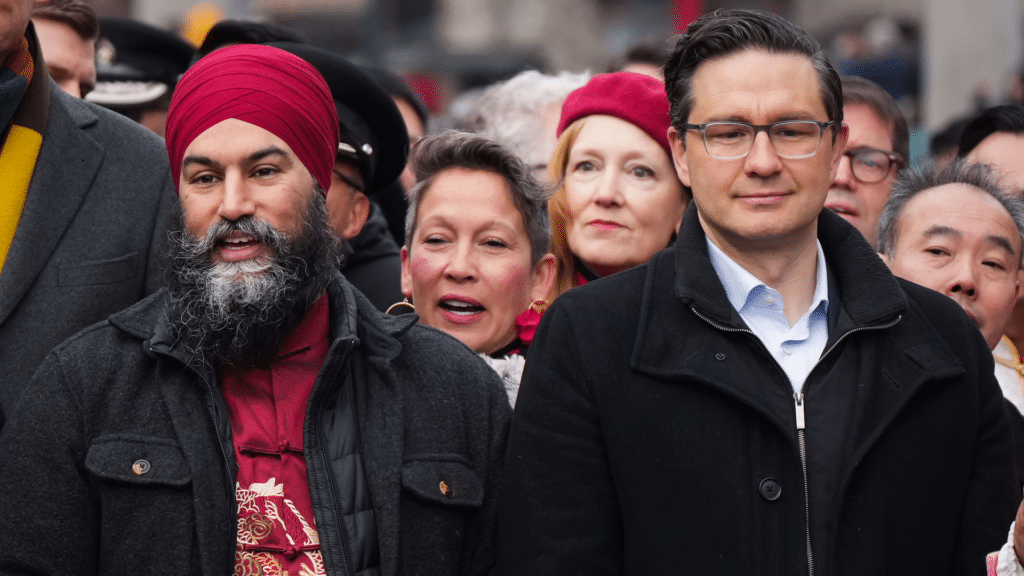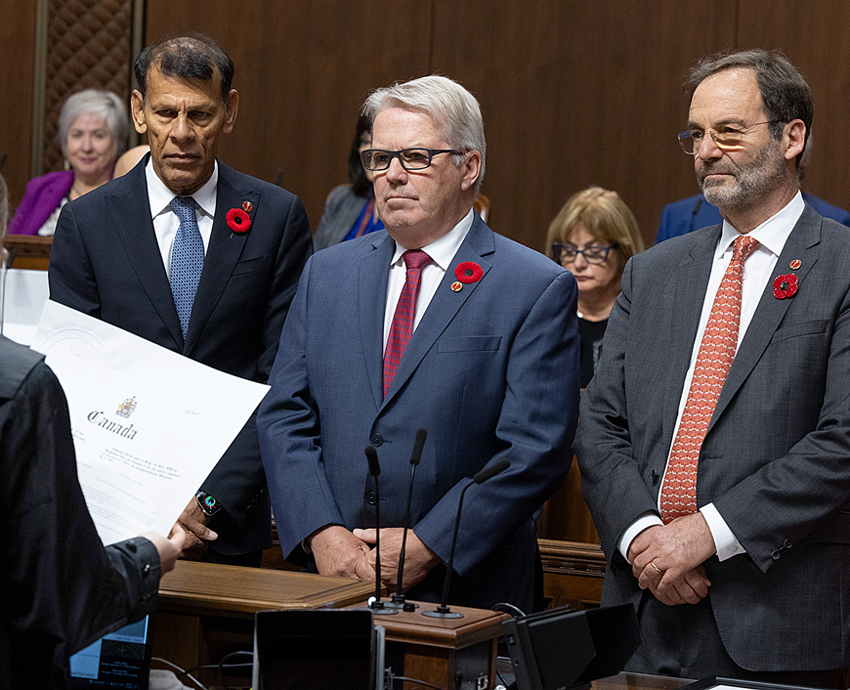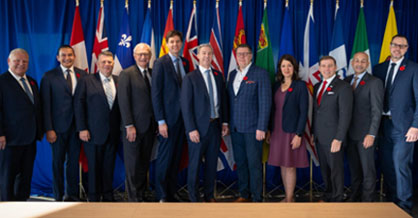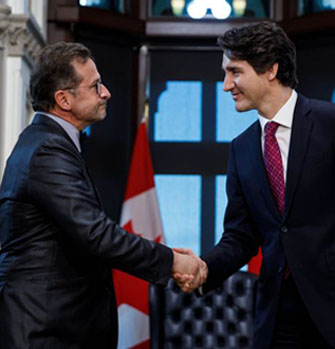None of Pierre Poilievre, Jagmeet Singh, and provincial premiers can seriously move Ottawa on carbon tax ??
Nov 8th, 2023 | By Randall White | Category: In BriefRANDALL WHITE. FERNWOOD PARK, TORONTO. WEDNESDAY, NOVEMBER 8, 2023. Two stories in the news the day before yesterday seemed to summarize the current somewhat crazed state of Canadian politics — at a time when much worse is going on elsewhere in Marshall McLuhan’s global village.
Sticking with the CBC News site (strictly for convenience), the first story is from Ottawa and headlined : “Liberals, Bloc Québécois strike down Poilievre’s pitch to exempt all home heating from carbon tax … New Democrats vote with Conservatives to support motion.”
Meanwhile, the second story comes from Halifax where provincial premiers and territorial leaders are meeting as the so-called Council of the Federation. (A group not mentioned in either of Canada’s two main written constitutional documents.) Its headline reads : “Canada’s premiers united in their criticism of federal housing policy, carbon tax changes … Provincial leaders demand national carbon tax reprieve after some energy consumers get a break.”
To me the vote in what the late Don Harron liked to call the Common House in Ottawa, against a “national carbon tax reprieve,” at more or less the same time as the provincial premiers spoke up for such a thing, said a lot about just where Canada is today — in the crazy political real world as opposed to the even crazier political opinion polls.
And I’m open to the argument that for most of the time between elections political opinion polls are not measuring the kind of democratic mass opinion that counts on election days — when a majority of the electorate is finally paying attention and making up their minds.
So, eg, the conservative surge so unmistakable in current Canadian opinion polls, possibly just midway between the federal elections of 2021 and 2025, is not something going on among some large mass of voters. (They are wisely just not that interested in politics between elections.)
PM Trudeau could stay in saddle for almost two more years?
The first near-conclusion I’d draw from how the carbon tax issue has lately spun out in our independent Canadian parliamentary democracy, at work in Ottawa, is that it strengthens the prospect the current parliament, with a government led by the Liberal leader Justin Trudeau, will remain in place more or less until the next quadrennial fixed election date of October 20, 2025.
In this case the official Liberal partner in the March 2022 Supply and Confidence Agreement, the Jagmeet Singh New Democrats, felt they had to vote with the Conservatives on the principle of equality for all forms of home heating tax exemptions. Mr. Singh took pains to make his distaste for voting with Conservatives clear, but felt he had to support equality in tax exemptions, if not necessarily the exemptions themselves. (Like, it seems, the NDP premiers of Manitoba and BC.)
All this is in keeping with the spirit and written form of the Liberal-NDP agreement — especially since the motion advanced by Pierre Poilievre was said to be “non-binding.” A minority government (like the present Trudeau Liberal regime) defeated on such a motion, in other words, would not be ultimately required to resign and call a fresh election. (Or as The Canadian Press has reported : “Last week, NDP House leader Peter Julian said the Conservative motion was ‘clearly not a confidence motion.’”)
Even in such circumstances the Trudeau Liberals, still with some deep roots in Quebec, managed to altogether avoid defeat by aligning with Yves-François Blanchet’s Bloc Québécois (which holds seven more seats than Jagmeet Singh’s New Democrats).
And the NDP-supported Conservative “motion was defeated by a vote of 186 to 135 … NDP Leader Jagmeet Singh and his party backed the motion, but Bloc Québécois Leader Yves-François Blanchet had told reporters ahead of question period that his MPs would vote against it.”
The provincial premiers aren’t meant to have regional influence in federal politics — that ought to be the job of a seriously reformed (and democratically elected) federal Senate
My second near-conclusion is just that the provincial premiers do not in fact have any serious influence in federal politics — and certainly ought not to have such a thing, again under either of Canada’s two main written constitutional documents (the Constitution Act, 1867 and the Constitution Act, 1982).

Another recent headline (this time from the Toronto Star) strikes me as particularly absurd : “Push Justin Trudeau on carbon price cut, Doug Ford tells Liberal MPs … In an open letter, Ford asked the 76 Liberal MPs in Ontario to join the growing chorus demanding Ottawa extend its three-year pause of the carbon levy for heating oil to other fuels widely used to warm homes.”
Doug Ford’s party won considerably less than a majority of the popular vote in the last Ontario election in 2022 (not much more than 40% in a record low-turnout election where only some 44% of the eligible electorate even bothered to vote). He simply has no credibility as someone with influence over federal MPs from a different party.

That Premier Ford imagines he might have such a thing says a lot about his increasingly strident flaws as an Ontario premier — despite his “winning” two elections (with considerably less than a democratic majority of the popular vote, thanks to the peculiarities of our current electoral system!).
If there in fact ought to be some more effective and constitutional channel for regional influence on federal politics (and I do think there ought to be, in some more ideal confederation than the one we have in Canada now), it should come through some serious and meaningful reform of the unreformed Senate of Canada.
Both Stephen Harper and more recently Justin Trudeau have played at the edges of this particular pond. But neither has had the courage to take on the kind of democratic Senate reform that might both improve regional influence, while finally strengthening the Canadian federal political community!




